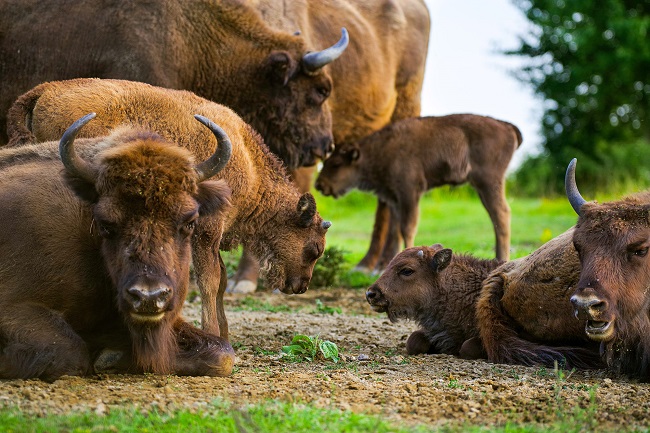As the climate changes, the risk of wildfires in Europe is increasing. Grazing large ungulates could be a cheap way to prevent these risks, experts said in connection with a spate of wildfires in southern and central Europe this year.
 Large ungulates: herd of bison with calves
Large ungulates: herd of bison with calves
“Progressive climate change towards drier and warmer conditions and the current overgrowth of landscapes are creating a dangerous combination. Prolonged droughts and increased amounts of fuel in the form of dry vegetation are causing landscapes to become Grazing with large ungulates is a very effective means of removing vegetation that allows for rapid spread of fire where there is old, dead grass and shrubs. “Even if there is,” explains Miroslav Zirk of the Biology Center of the Academy of Sciences of the Czech Republic.
Grazing can also prevent fires from returning in some areas where fires have recently occurred.
“Burned areas quickly become overgrown with extensive grass species, and that dry cover is known to be highly flammable and is often the site of widespread fire spread. These risks can be minimized because animals also forage on grass species that livestock cannot normally process, for example,” added Zirk.
Large ungulates such as bison, wild horses, and later aurochs provide fire protection, especially in national parks, nature reserves, and protected landscape areas, as well as areas of former military activity. . For example, bison have long lived in Drawsko in West Pomerania, Poland’s largest military region, and are often used by NATO forces for training exercises.
For hundreds of thousands of years, large ungulates have protected nature from large-scale fires. Scientific studies have shown that the number of rural wildfires increased significantly in the past after humans eradicated large herbivores from the landscape.
“It’s not surprising. The United States and Canada, for example, understood decades ago that the best way to prevent fires was to reduce the amount of potential fuel.” When landscape phenomena in the form of large herbivores are present, there are fewer fires in the landscape, and when fires occur, the impact is over a much smaller area. Another preventive measure is the trodden trails of large ungulates that crisscross the landscape, which can often stop the spread of fires, Zirk added.
Moreover, it is a low cost solution. “The advantage of large ungulate grazing is that it is very cheap compared to other methods of landscape management and fire protection, and most importantly, it works in the long term without the need for additional investment. This is to prevent excess dry herbaceous biomass in the landscape, which is one of the main causes of fires. Additionally, it increases local biodiversity and supports the landscape’s ability to retain water.” Dalibor Dostal of the conservation group European Wildlife added.
Because large ungulate grazing is part of their natural process, it can also occur in more highly protected areas of national parks and other protected areas.
Unlike livestock, large ungulates do not require treatment with veterinary medicines such as anthelmintics and antibiotics, but the widespread use of antiparasitic drugs in livestock has led to the contamination of landscapes with toxic substances and many cause serious adverse effects.
This year, fires in the European Union have destroyed 700,000 hectares of forest.

